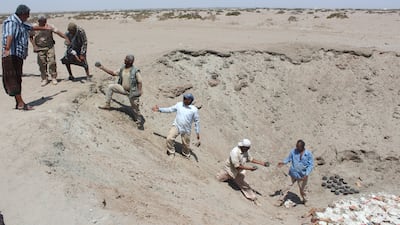It is one of the most enduring images of Diana, Princess of Wales. Wearing a visor and bombproof vest, she picked her way carefully through an active minefield in Angola, where one person in every 333 had lost a limb to the explosive devices. "I am not a political figure," she said in response to criticism from parliamentarians, "my interests are humanitarian."
That expedition in 1997 put the issue of landmines on the international agenda and was partly credited with attracting 122 signatories to the Ottawa Mine Ban Treaty the same year, banning the stockpiling, production and use of mines.
More than 20 years on, we are seeing an ever more pressing need for action on mines, whose deadly legacy survives long after conflicts have ended.
In Yemen, UAE and Saudi armed forces have defused more than 40,000 and say Houthi rebels have planted a suspected one million mines across the country, some disguised to look like rocks or toys.
Syria is facing an unprecedented landmine crisis, with departing ISIS fighters booby trapping household items like teapots, pillows and fridges to target families returning home for the first time in years.
In the 60-plus countries still contaminated by landmines, they wreak unspeakable devastation, killing and maiming indiscriminately and activating years after they were rigged. Their presence is difficult to detect but they cause a ripple effect of fear among populations and hinder recovery from warfare and development, long after peace has been established.
The retreating Houthis who have peppered the Yemeni landscape with these killing machines supplied by Tehran have only one purpose in mind: to spark terror in the very civilians they sought to govern by force.
UAE mine specialists have been combing the land to destroy them, a ceaseless battle as the Houthis often return to plant devices overnight.
The rebels care little for the havoc and destruction they are perpetuating on a scale not seen since the Second World War.
As Emirati minesweeper Ghaneem Al Kaabi says, Yemen is unlikely to be clear of mines in his lifetime.
That is a sobering thought. Yemenis who have lost so much at the hands of the rebels are being robbed a second time of their right to peace of mind.

